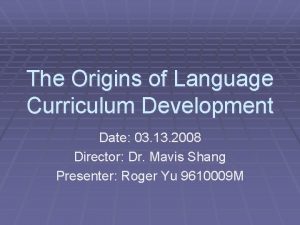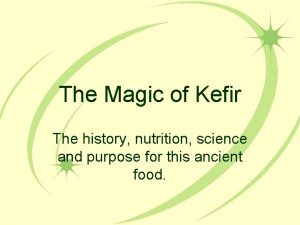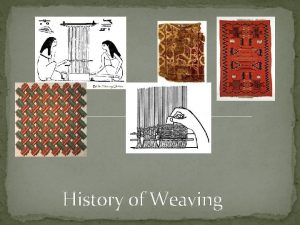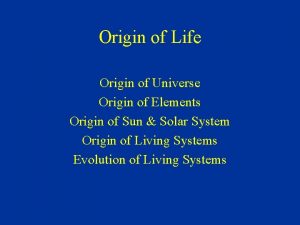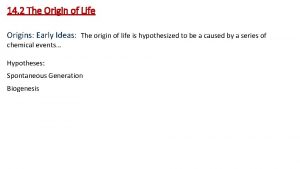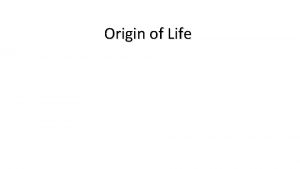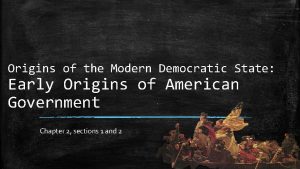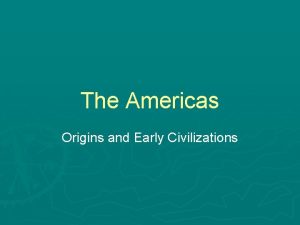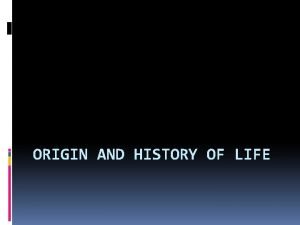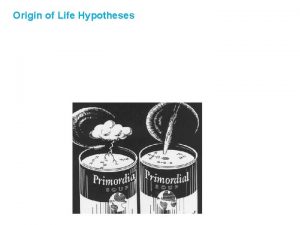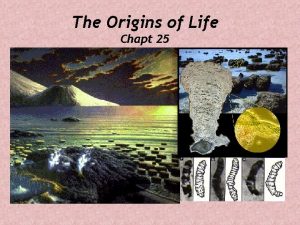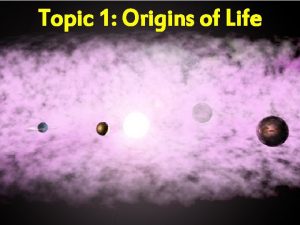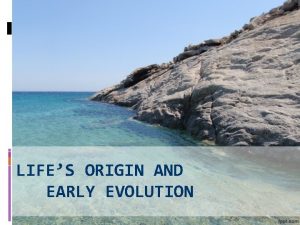Origin of Life Origin of Life Origins Early















- Slides: 15

Origin of Life

Origin of Life Origins: Early Ideas Spontaneous generation is the idea that life arises from nonlife. Francesco Redi, an Italian scientist, tested the idea that flies arose spontaneously from rotting meat.

Origin of Life Theory of Biogenesis The theory of biogenesis states that only living organisms can produce other living organisms. Louis Pasteur designed an experiment to show that biogenesis was true even for microorganisms.

Origin of Life

Origin of Life Origins: Modern Ideas Simple organic molecule formation ▪ Abiogenesis is the concept of life originating from nonliving matter. ▪ The primordial soup hypothesis was an early hypothesis about the origin of life. ▪ Organic molecules could have been synthesized from simple reactions. ▪ UV light from the Sun and electric discharge in lightning might have been the primary energy sources.

Origin of Life Origins: Modern Ideas 1924, Aleksandr Oparin theorized that a "primordial soup" of organic molecules could be created in an oxygen-less atmosphere through the action of sunlight. 1953, Stanley Miller and Harold Urey were the first to show that simple organic molecules could be made from inorganic compounds. Later, scientists found that hydrogen cyanide could be formed from even simpler molecules in simulated early Earth environments.

Origin of Life Stanley Miller and Harold Urey Experiment

Origin of Life

Origin of Life

Origin of Life Making Proteins Life requires proteins. One possible mechanism for the formation of proteins would be if amino acids were bound to a clay particle.

Origin of Life Genetic Code Some RNA sequences appear to have changed very little through time. Many biologists consider RNA to have been life’s first coding system. Other researchers have proposed that clay crystals could have provided an initial template for RNA replication.

Origin of Life Cellular Evolution Scientists hypothesize that the first cells were prokaryotes. Many scientists think that modern prokaryotes called archaea are the closest relatives of Earth’s first cells.

Origin of Life Photosynthesizing Prokaryotes Archaea are autotrophic. They do not obtain their energy from the Sun. Archaea also do not need or produce oxygen. Many scientists think that photosynthesizing prokaryotes evolved not long after the archaea. Prokaryotes, called cyanobacteria, have been found in rocks as old as 3. 5 billion years.

Origin of Life The Endosymbiont Theory The ancestors of eukaryotic cells lived in association with prokaryotic cells. The relationship between the cells became mutually beneficial, and the prokaryotic symbionts became organelles in eukaryotic cells. This theory explains the origin of chloroplasts and mitochondria.

Origin of Life
 Early cpr and early defibrillation can: *
Early cpr and early defibrillation can: * Origins of sociology
Origins of sociology Selection and gradation in language teaching
Selection and gradation in language teaching Origins of kefir
Origins of kefir The hunger games questions
The hunger games questions Historical origins of the health belief model
Historical origins of the health belief model Rastafari origins
Rastafari origins Origins cwv 101
Origins cwv 101 Origins of the cold war
Origins of the cold war Origins of the cold war
Origins of the cold war History of weaving
History of weaving Origins of judo
Origins of judo Tennis scoring rules
Tennis scoring rules Hip and leg muscles
Hip and leg muscles Study of word origins
Study of word origins Place of origin for sikhism
Place of origin for sikhism


